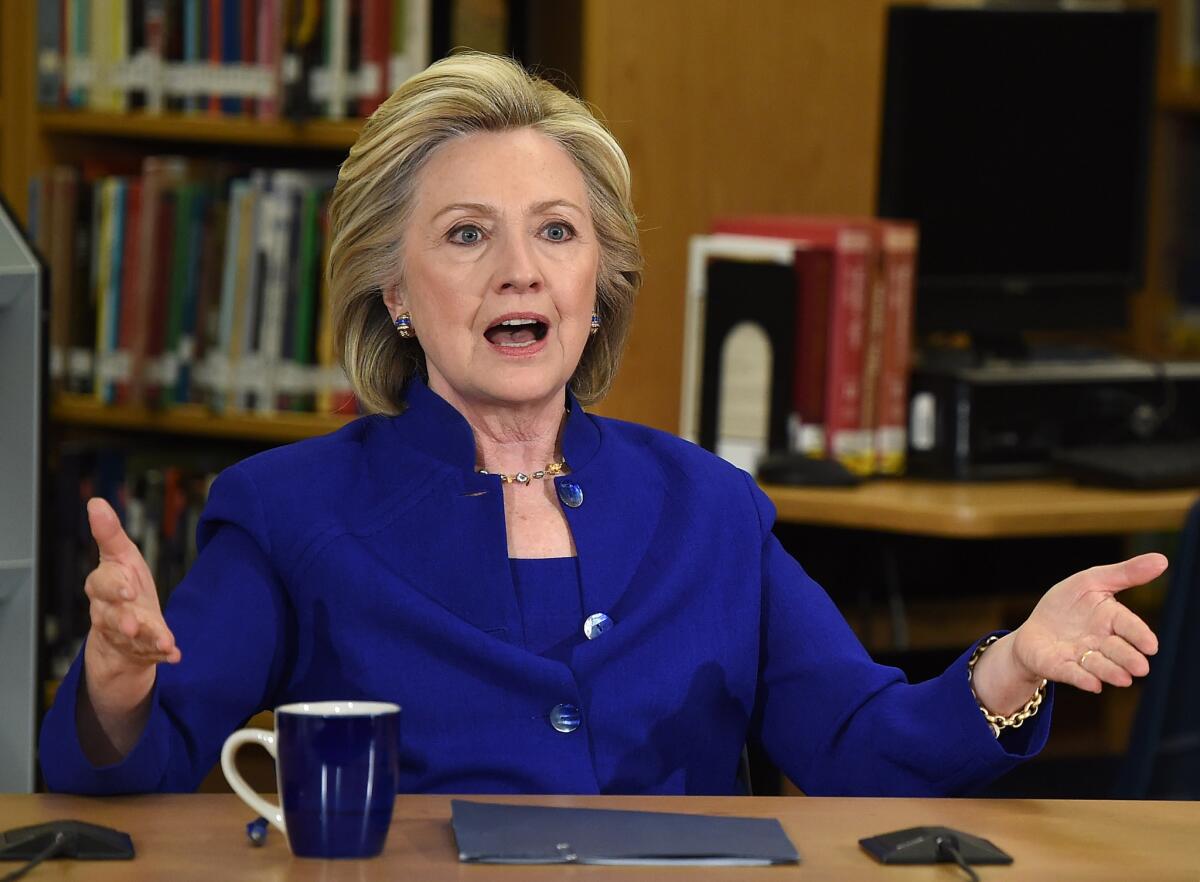Hillary Clinton’s use of ‘super PAC’ may undercut her finance reform message

Hillary Rodham Clinton speaks at a Las Vegas high school May 5. She traveled next to California, where some of her fundraising efforts appear to undercut her message pushing campaign finance reform.
- Share via
Reporting from Washington — Hillary Rodham Clinton’s campaign team had hoped to frame her trip hopscotching through the mansions of some of California’s deepest-pocketed donors this week as an exercise in modesty, highlighting the relatively low price of a ticket to the events as a reflection of her commitment to cultivating the grass roots.
But that narrative quickly unraveled when word got out that the candidate was also using the California trip as an occasion to begin courting an entirely different group.
Clinton, who has emphasized campaign finance reform in the early stage of her latest White House bid, has apparently already decided the modest approach alone won’t be enough. She is going after much bigger checks, much sooner, and in a much more aggressive way than her campaign had revealed.
The candidate will be pushing the boundaries of campaign finance law further than any Democratic presidential contender ever has by directly asking donors to give to a friendly “super PAC” that can raise unlimited amounts of campaign cash from donors, according to a person familiar with her plans. That effort started in California on Wednesday, when Clinton met in San Francisco with potential donors of the organization, Priorities USA Action. She had another meeting in Los Angeles on Thursday.
Clinton’s plans to raise money for Priorities USA was first reported by the New York Times. Campaign officials are declining to comment.
Clinton would not be the first contender in this year’s race to go after such cash. On the Republican side, former Florida Gov. Jeb Bush has been soliciting checks for as much as $1 million for his super PAC.
Candidates avoided such activity in the 2012 race, adhering to a law that says they cannot coordinate directly with the groups. (Bush, though, has not yet declared his candidacy and is free to work with the group until he does so.)
But the increasingly permissive approach of the Federal Election Commission, whose members are deadlocked over the question of how candidates can and cannot engage with super PACs, is leading the presidential contenders to take ever bolder approaches. Clinton supporters say she is caught up in a campaign arms race and she has no choice but to use the tools her opponents have at their disposal.
Still, the quick shift on fundraising puts Clinton in an awkward position.
“Just three weeks ago, Hillary Clinton decried unaccountable money in politics and even called for amending the Constitution to ban it,” said Jeff Bechdel, communications director for America Rising, a conservative research group. “Today, she announced she’s going to personally court donors and raise money for her own super PAC. … Clinton’s hypocrisy knows no bounds.”
The California trip was supposed to be a chance for Clinton to showcase a more modest approach to fundraising, one that squared with what she promised would be a campaign that is humble, lean and focused on the values of everyday Americans.
Even though the events were to be held in the homes of billionaires and mega-millionaires, including hedge-fund titan Tom Steyer and media mogul Haim Saban, donors were not to give more than $2,700.
Those who want to give more than that can encourage others to give checks, becoming what’s known as a campaign bundler. Clinton’s campaign calls its bundlers “Hillstarters,” and those designated as such get perks that include invites to receptions with the candidate. Clinton is making it much easier to get in this circle of fundraisers than she did eight years ago, when supporters had to raise $100,000. Now, they need only to generate $27,000 for the campaign.
“It’s a far smaller bundling program than other presidential campaigns and is designed to involve more people and build the donor base,” a campaign aide said.
But that effort to engage a larger group of donors early on and set a tone of relative modesty got overshadowed quickly, as donors pushed the candidate to seize the momentum from her announcement and start collecting big checks from big donors eager to write them.
evan.halper@latimes.com
Twitter: @evanhalper
Times staff writer Michael A. Memoli contributed to this report.
More to Read
Get the L.A. Times Politics newsletter
Deeply reported insights into legislation, politics and policy from Sacramento, Washington and beyond. In your inbox twice per week.
You may occasionally receive promotional content from the Los Angeles Times.











